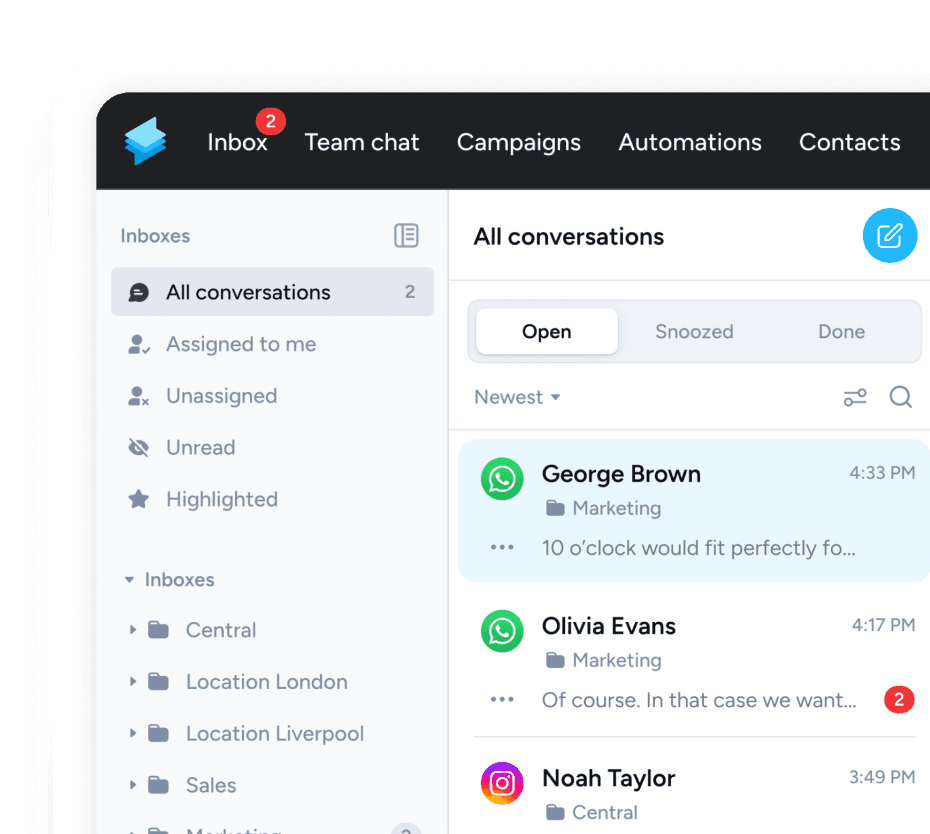With up to 2.5 billion users, WhatsApp is the world's most popular messenger. In all but 25 countries around the world, WhatsApp is the leading direct messaging app. This typically means that more than 80% of all smartphone users actively use the app.
Its reach is comparable to social media platforms like Facebook, Instagram or TikTok. However, WhatsApp's focus on personal contact makes it an excellent CRM channel.
Messengers as a marketing idea are nothing new, but live chats and chatbots have rarely lived up to expectations. This has changed since the launch of the WhatsApp Business API in 2018. Marketing teams now have the reach of WhatsApp, with the functionality of marketing automation tools at their fingertips.
WhatsApp can now be used in as many ways as email, but with 90% open rates, it achieves the acceptance of classic text messaging and offers users more opportunities for direct interaction. This requires the use of the WhatsApp Business Platform (WhatsApp Business API) in your own martech stack or a messaging platform such as Superchat, which already has the integration and functionality to use it effectively.
The most popular uses of WhatsApp in marketing
WhatsApp Newsletters: Send personalised messages to any number of contacts. You can also collect and manage opt-ins directly in Messenger.
Marketing automation:* Create automated workflows, even chatbots. Not only can you automate campaigns, but you can also suggest responses or use the responses and reactions to your messages to map forms, surveys, lead qualification flows and more in Messenger.
Integrations: Integrate WhatsApp into your existing tool stack to trigger messages through events, for example from your CRM or shop system. You can also use your contacts' messages to automate processes like booking appointments or making purchases.
Click-to-Chat Ads: Use WhatsApp as a landing page for your Facebook or Instagram ads. Combined with automations, you can easily use WhatsApp as a form for leads or applications.
WhatsApp in Numbers
WhatsApp currently has up to 2.5 billion active users(1). In Germany, there are around 60 million. Although WhatsApp is particularly popular with young users, with 90% of 16-19 year olds(2) using the app, it is generally actively used across all age groups.
But businesses with older customers also value it. For example, more than 1,000 pharmacies already rely on Superchat to use WhatsApp in a privacy-compliant way.
Another benefit is WhatsApp's global reach. With the exception of 25 countries(3), the messenger is the market leader almost everywhere. This also makes the channel very attractive for targeting international users.
marta, a Berlin-based healthcare startup, recognised that many Eastern European caregivers preferred WhatsApp as a communication channel. The team has now fully integrated WhatsApp into its own processes, including Salesforce, and uses the messenger as its primary channel for recruiting and keeping in touch with caregivers.
Performance KPIs for WhatsApp & more
Even though messengers like WhatsApp have a high reach, it is crucial that this reach can be converted. For most businesses, this means increasing sales through WhatsApp & Co.
In general, as with email, it takes longer to build reach through 1:1 communication than through one-to-many channels such as advertising on Google or Meta. On the other hand, direct channels generally have a higher conversion rate and the cost per conversion drops sharply over time.
The strength of messengers, in contrast to email, lies in the high open rate and fast response time of users. Previous studies and empirical data show that Messenger works as well as text messaging.
This means that users open messages more often and respond or convert faster and more often. However, recent studies show that shopping baskets, i.e. the volume of an order, are larger with email newsletters.
With WhatsApp in particular, it is important to note that costs are incurred per conversation and per user. This makes it all the more important to segment customers in order to personalise and ensure that contacts only receive relevant messages.
Messaging benchmarks marketers should know
| WhatsApp / Messenger | ||
|---|---|---|
| Openrate | 85-95% | 20–30% |
| CTR (Click-Through Rate) | 15–20% | 3–5% |
| CVR (Conversion Rate) | Ø 5% | Ø 1.5% |
| Unsubscribe Rate (Newsletters) | <0.5% | <0.5% |
| Response time | Ø 90 seconds | Ø 90 minutes |
How to use WhatsApp for marketing and stay data-compliantly
The safest way to stay compliant with WhatsApp Business is to use the WhatsApp API. This way, the responsibility for privacy lies with the messaging solution provider that has integrated the API. This means that businesses must obtain permission to contact people via WhatsApp.
However, as with any tool, it's the responsibility of the business to use the tool in a privacy compliant manner. This includes, for example, obtaining opt-in or consent to be contacted via WhatsApp.
Superchat is designed to help businesses use WhatsApp, even under strict data protection regulations such as GDPR. This means
- Servers are located in Germany.
- Specific AV contracts.
- No unauthorised access to contacts by the messaging apps.
- Standard end-to-end encryption of all data, conversations and backups.
Collecting Opt-Ins in WhatsApp
The table below shows when a company needs to collect an opt-in (✅) to chat with customers:
| MEDIUM | CUSTOMERS STARTS CONVERSATION | BUSINESS STARTS CONVERSATION |
|---|---|---|
| WhatsApp Newsletter | ✅ | ✅ |
| WhatsApp Chat | ❌ | ✅ |
For WhatsApp newsletters, it is best to opt-in directly on WhatsApp using a keyword, i.e. a specific message that companies specify for the opt-in.
Opt-ins are important for WhatsApp in two ways. Firstly, because it is necessary for the data-compliant use of WhatsApp as a marketing channel in many countries. Second, because interactions in messages via the API for Meta play an important role in assessing account quality.
Account quality determines, among other things, how many conversations a business can initiate on WhatsApp per day. Businesses that actively use their WhatsApp Business account and send highly read messages can initiate an unlimited number of conversations.
Business accounts whose messages are of low quality or are regularly marked as spam will have a lower reach and may even be blocked.
If the WhatsApp conversation is not marketing related, a standard consent notice will suffice in most countries. For example, a customer contacts the company via the website and the company then refers to the applicable data protection rules and the use of WhatsApp Business via, for example, Superchat.
WhatsApp Newsletters
WhatsApp newsletters are promotional messages that businesses proactively send to their contacts. They are sometimes referred to as promotional messages or marketing alerts.
WhatsApp Newsletters work like WhatsApp's broadcast feature, but can be sent to more contacts. Businesses also have the option to include a CTA in the message when sending templates via the WhatsApp API.
With high open and click rates, WhatsApp newsletters are among the most popular marketing campaigns on Messenger.
Things to keep in mind:.
- Sent via the WhatsApp Business API only.
- Contact opt-in is mandatory.
- Newsletters can only be sent using approved templates.
The benefits of WhatsApp Newsletters at a glance
- Keep messages out of your customers' spam folders.
- Easy to create with just a few clicks, no time-consuming design.
- The open rate for WhatsApp messages is over 90%.
- The WhatsApp newsletter looks the same on all devices.
- Modern and high-quality user experience.


Marketing Automation with WhatsApp
Like email, WhatsApp messages are more effective when they are sent at the right time and tailored to the customer. With the WhatsApp Business API, businesses can fully automate WhatsApp campaigns and coordinate them with other efforts.
Although messages on Messenger offer less flexibility in content and design than email, this is an advantage when it comes to automation. This is because the response times are much faster and the focus is on conversations.
Unlike traditional marketing automation campaigns, businesses do not have to wait long for users to interact. With automation in Messenger, you can use the replies in the conversation or even quick replies to messages directly and incorporate them into the flow. The WhatsApp API can also be used to send 'quick replies' - suggested responses that the customer can send with a single click.
Replies can also be used directly to add or update contact information. This makes it easy to create workflows in WhatsApp and many other messengers, for example to map forms or build entire chatbots.
Integrate WhatsApp With Your Martech-Stack
Marketers use an average of 12 different tools to manage their campaigns, from preparation to performance measurement. And the number is growing. Then there are the tools and interfaces with other departments, such as sales, because marketing is not an end in itself.
Even in relatively small organisations, this leads to high levels of complexity and dependency. Siloed solutions mean more work at this point. This is why messengers like WhatsApp should be integrated into existing tools and processes as much as possible.
Messaging platforms such as Superchat can usually be connected to a variety of other tools to synchronise and automate processes. This can be done either through a direct API connection or through tools such as Zapier or Marke. These are no-code solutions that allow businesses to connect tools and automate workflows with just a few clicks.
Integrations significantly extend the functionality of WhatsApp & Co, especially in combination with automation. Messages can be used in real-time to update data or provide information, such as service requests.
Businesses can map complete lead funnels in WhatsApp and seamlessly integrate new leads into their marketing and sales process. They can also use WhatsApp to automatically trigger messages, such as an event in the CRM or shop system, or an automatic appointment reminder.
Use Click to Chat Ads - turn Messenger into landing pages
Click to chat ads, also known as click to messenger ads, are becoming increasingly popular with the boom in WhatsApp Business. These are ads, usually on social media sites such as Facebook or Instagram, that target a messenger rather than a landing page or form.
Thanks to the automation enabled by many Messenger APIs, chatbots can replace forms in Messengers. Businesses can also get personally involved in the conversation and engage directly with users via chat.
The ability to integrate WhatsApp & Co. with other tools also makes it easy to personalise the funnel in real time and integrate it with other processes. Another advantage is that the process is automatically optimised for mobile devices thanks to the messenger interface.
Click-to-chat ads are a relatively new advertising format that is currently being heavily courted by Meta in particular. As Messenger conversations are very intuitive for most users, interaction rates are generally high and abandonment rates low.

